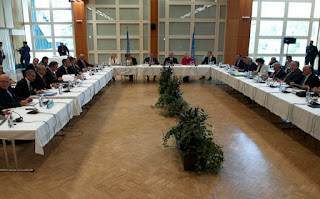The Empowerment of Turkey's Social Capital
The empowerment of the social capital of the country has become one
of the most important
aspects arising out of the Occupy Gezi movement in Turkey. While the
definitions of the term ‘social capital’ are many, I would posit that the World
Bank’s is the most inclusive:
In other world, the social
capital refers both to a country’s institutions and their representatives and
to its civil society and the interplay between both. It raises the issues of
legitimacy, accountability, democracy, education and responsibility by both the
institutions and civil society. In the case of Turkey, the Gezi Park issue
starkly exemplifies this relationship: a group of environmentally conscious
Istanbul residents and Turkish citizens attempted by means of a peaceful sit-in
in the park to highlight the issue of the disastrous effect unfettered urban
development has been having on the quality of life of Istanbul’s denizens by
encroaching on their dwindling green spaces. The sit-in thus epitomized various
dimensions – an environmental message which touched upon the legitimacy of the
decision to further urbanize the area without consultation of those immediately
affected by it (touching upon the issues of accountability and democracy as the
mechanisms of local government failed to provide the requisite consultation).
The education aspect derives from the awareness raised for the need to protect
the environment to the participatory nature of democracy while the
responsibility lies on both the institutions and their elected and non-elected
representatives and civil society to find an acceptable modus vivendi regarding
the future of the development project or the sustainability of Gezi Park as
well as the maintenance of the social cohesion of the country in the wake of
the ongoing large scale nationwide protests which brought out a number of
grievances that reflect the core themes of legitimacy, accountability,
democracy, education and responsibility.
These, the aforementioned
themes and the related grievances alike, also reflect a defining moment in the
ongoing process of democratic consolidation. Undoubtedly, the historically
authoritarian nature of the Turkish Republic is under duress as it shows its
resilience by being unable to cope with the immediacy of the demands placed
upon it as well as their qualitative nature. As a result, the ongoing
mishandling of the protests continues thereby threatening the social cohesion,
which both state and civil society have a responsibility to uphold. Hence, the
vastly disparate interpretations of democracy where the political leadership
assumes that its legitimacy stems from its comfortable electoral and parliamentary
majority while a significant part of civil society suggests that pluralism and
its recognition is an essential component of any democratic order.
Consequently, the evolving
nature of the protests (including the state’s reaction) has accelerated the
need for the reformulation of the precepts of social cohesion in Turkey;
otherwise said, the need for a new social contract between country’s social
capital --- its institutions and its civil society --- which is deemed as
legitimate by all and would allow for greater prosperity, equity, and
sustainability (institutional, societal and developmental).
This brave new leap forward can
only be successful if embraced by the whole of the country’s social capital. It
implies challenging many of the remaining vestiges of the past as well as
polarizing cleavages of the present and embracing a vibrant segment of civil
society that before 31 May 2013 were either disenfranchised or apathetic but
have since discovered or are in the process of discovering the meaning of what
it is to be a citizen in contemporary democratic and liberal societies where
civic participation is sine qua non condition.
These are challenging,
exciting, and historical moments that neither state nor society can afford to
disregard or denigrate.


Comments